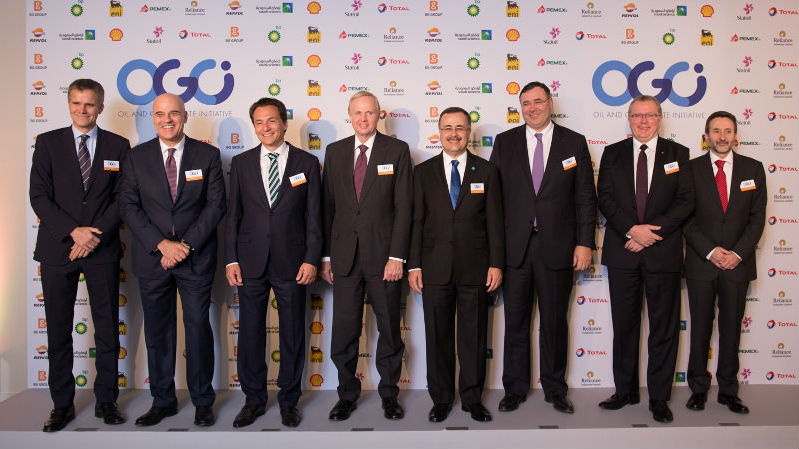Oil Majors Will Work to Common Climate Change Goal

The chief executive officers of 10 of the world’s largest oil and gas companies, which together provide almost a fifth of all oil and gas production and supply nearly 10 percent of the world’s energy, have declared their collective support for an effective climate change agreement to be reached at next month’s United Nations (U.N.) Conference of Parties to the U.N. Framework on Climate Change (COP21).
In their milestone declaration, the CEOs of the 10 companies that currently make up the Oil and Gas Climate Initiative (OGCI) – BG Group, BP, Eni, Pemex, Reliance Industries, Repsol, Saudi Aramco, Shell, Statoil and Total – confirmed that they recognize the general ambition to limit global average temperature rise to two degrees centigrade and that the existing trend of the world’s net global greenhouse gas (GHG) emissions is not consistent with this ambition.
The OGCI member companies have taken significant actions to reduce their GHG footprint, with combined GHG emissions from their operations reducing by around 20 percent over the past 10 years, says the group in a statement.
In their declaration the 10 CEOs said:
“Our shared ambition is for a 2°C future. It is a challenge for the whole of society. We are committed to playing our part. Over the coming years we will collectively strengthen our actions and investments to contribute to reducing the GHG intensity of the global energy mix. Our companies will collaborate in a number of areas, with the aim of going beyond the sum of our individual efforts.”
The 10 CEOs are: Helge Lund, BG Group; Bob Dudley, BP; Claudio Descalzi, Eni; Emilio Lozoya, Pemex; Mukesh Ambani, Reliance Industries; Josu Jon Imaz, Repsol; Ben van Beurden, Royal Dutch Shell; Amin Nasser, Saudi Aramco; Eldar Sætre, Statoil; and Patrick Pouyanné, Total.
The OGCI also launched its collaborative report - More energy, lower emissions – highlighting practical actions taken by member companies to improve GHG emissions management and work towards improving climate change impacts in the longer term. These actions include significant investments in natural gas, carbon capture and storage, and renewable energy, as well as low-GHG research and development.
Together the declaration and report set out key areas where the OGCI companies will focus their collaboration, including:
Efficiency: optimizing efficiency of their own operations; improving the end-use efficiency of their fuels and other products and working with manufacturers and consumers to improve the efficiency of road vehicles.
Natural gas: contributing to increasing the share of gas in the global energy mix, ensuring it results in significantly lower lifecycle emissions than other fossil fuels for power generation; eliminating routine flaring and reducing methane emissions from their operations.
Long-term solutions: investing in R&D and innovation to reduce GHG emissions; participating in partnerships to progress carbon capture and storage; contributing to increasing the share of renewables in the global energy mix.
Energy access: developing projects to provide people with access to energy in partnership with local and national authorities and other stakeholders.
Partnerships and multi-stakeholder initiatives: seeking opportunities to accelerate climate change solutions by working collectively or individually in industry and other initiatives.
The OGCI is a CEO-led, voluntary, oil and gas industry initiative that aims to catalyze practical action on climate change through best practice sharing and collaboration.
The OGCI was established following discussions held during the January 2014 World Economic Forum Annual Meeting and was officially launched at the September 2014 U.N. Climate Summit.
Earlier Joint Action
In June this year, major oil and gas companies, BG Group, BP, Eni, Royal Dutch Shell, Statoil and Total, announced their call to governments around the world and to the United Nations Framework Convention on Climate Change (UNFCCC) to introduce carbon pricing systems and create clear, stable, ambitious policy frameworks that could eventually connect national systems. These would reduce uncertainty and encourage the most cost effective ways of reducing carbon emissions widely.
The six companies set out their position in a joint letter from their chief executives to the UNFCCC Executive Secretary and the President of the COP21.
Flaring
In April this year, 25 oil companies, oil-producing nations and development organizations signed an agreement to end the practice of routine flaring of natural gas by 2030.
Royal Dutch Shell, Statoil, Kuwait Oil Company, Russia, Norway and the Asian Development Bank were among those making the commitment at the World Bank in Washington.
But globally every year, around 140 billion cubic meters of associated natural gas is wastefully burned or flared at thousands of oil fields. This results in more than 300 million tons of CO2 being emitted to the atmosphere - equivalent to emissions from approximately 77 million cars.
Together with Statoil and Norway, the other signatories endorsed the initiative recognizing that routine gas flaring is unsustainable from a resource management and environmental perspective. They all agreed to cooperate to eliminate ongoing routine flaring as soon as possible and no later than 2030.
The OGCI declaration is available here.
The OGCI report is available here.
